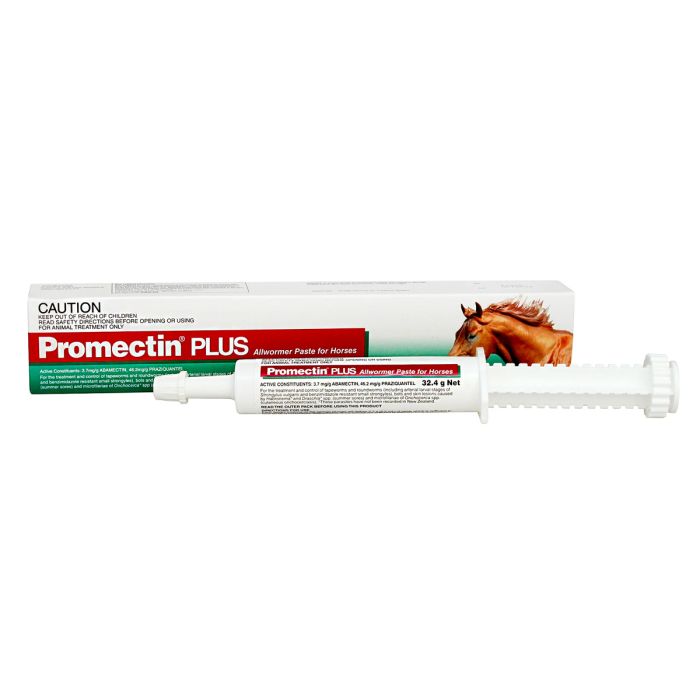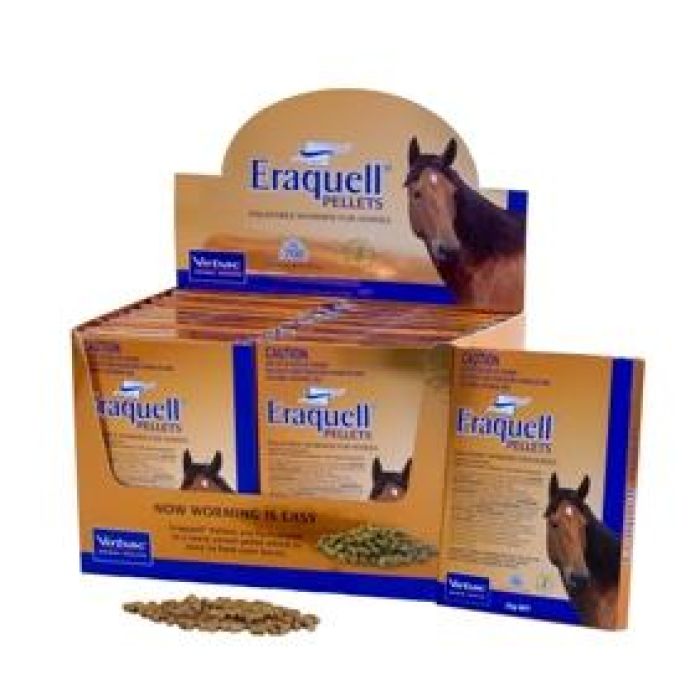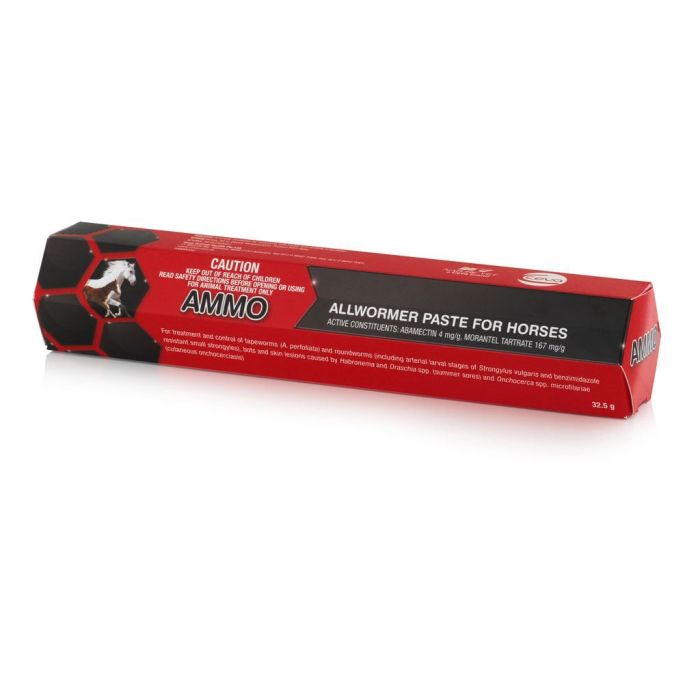Promectin Plus Horse Paste - Jurox
JUR-4624
Jurox Promectin Paste Anthelmintic for the treatment of internal and external parasites of horses and for alleviation of mineral deficiencies
Promectin Plus
32.4g
Jurox
Promectin Plus Allwormer Paste for Horses contains Abamectin 3.7 mg/g & Praziquantel 46.2 mg/g
Promectin Plus combines Abamectin, a macrocylic lactone, with Praziquantel a prazinoisoquinoline, in a palatable oatmeal flavoured paste.
Abamectin is a highly effective broad spectrum wormer with activity against gastrointestinal, pulmonary and cutaneous nematodes, bots and external parasites. Abamectin acts by binding selectively to glutamate gated chloride channels in invertebrate nerve and muscle cells causing depolarisation of the nerve and muscle cells leading to paralysis and death of the parasites Abamectin has good activity against both mature and immature stages of the nematodes. In the horse, this is particularly of advantage and regular treatment will reduce the chances of verminous arteritis and colic associated with Strongylus vulgaris. Abamectin has been demonstrated to be safe when used at twice the recommended dose in foals, pregnant mares and breeding stallions and up to 5 times the recommended dose in adults
Praziquantel is a prazinoisoquinoline which is readily absorbed from the gastro-intestinal tract and excreted in the bile and urine. Praziquantel has an extremely high activity against all species of tapeworms. Praziquantel is absorbed readily and rapidly by Cestodes (tapeworms) and causes a rapid tetanic spasm of the musculature of the parasite and vacuoles to appear in the tegument. In the tapeworm, there is first rapid contraction of the muscles and then a rise in the cell membrane calcium permeability which subsequently leads to muscle paralysis. Praziquantel has been shown to have a wide safety margin
Promectin Plas is Safe against the following Worms:
Small Strongyles
Including (adult and immature) benzimidazole resistant strains of:
- Cyathostomum spp.
- Cylicocylus spp
- Cylicostephanus spp.
- Cylicodontophorus spp.
- Gyalocephalus spp.
Large Strongyles
- Strongylus vulgaris (adults and arterial larval stages)
- Strongylus edentatus (adults and tissue stages)
- Strongylus equinus (adults)
- Triodontophorus spp. (adults)
Pinworms
- Oxyuris equi (adult and immature)
Bots
- Gasterophilus spp. (oral and gastric stages)
Lungworms
- Dictyocaulus arnfieldi (adult and immature)
Ascarids
- Parascaris equorum (adult and immature)
Neck Threadworms
- Onchocerca spp.* (microfilariae)
Intestinal Threadworms
- Strongyloides westeri (adults)
Tapeworms
Adult and immature, heads and segments of:
- Anoplocephala perfoliata
- Anoplocephala magna*
- Paranoplocephala mammillana*
Hairworms
- Trichostrongylus axei (adult)
Large Mouth Stomach Worms
- Habronema muscae (adult)
Promectin Plus effectively controls skin lesions caused by Habronema and Draschia spp. cutaneous larvae (summer sores) and microfilariae of Onchocerca spp (cutaneous onchocerciasis)
Precautions
Some animals have experienced skin reactions shortly after treatment with macrocyclic lactone worming products. This has usually been associated with a heavy infestation of Onchocerca microfilaria – the reaction thought to be is due to large numbers of the microfilaria dying Skin irritation usually subsides in a couple of days however symptomatic treatment may be required in severe cases
Promectin Plus has a wide safety margin and provided proper care is taken to handle animals, it is safe to use in foals, yearlings, stallions and pregnant mares
First Aid
Poisonous if swallowed - if poisoning occurs contact a doctor or Poisons Information Centre May irritate skin and eyes – wash hands after use If skin contact occurs, remove contaminated clothing and wash skin thoroughly
Directions for Use
- All horses should be included in a regular parasite control program with particular attention paid to mares, foals and yearlings. Because re-infection is common, treatment must be repeated routinely for effective control
- Consult your veterinarian for a control program to meet your needs, however in general treatment should be repeated every 6 to 8 weeks for effective worm control
- Ideally pregnant mares should be treated 4 weeks prior to foaling and foals treated from 6-8 weeks of age and onwards
- Administer orally - 0.2 mg/kg abamectin and 2.5 mg/kg praziquantel
- Administer directly into the mouth by placing the syringe in the gap between the front and back teeth, deposit the required amount of paste on the back of the tongue and then raise the horse’s head immediately after to ensure the full dose is swallowed, or mix with feed
- Each weight marking on the syringe plunger will deliver 2.7 g (2.5 mL) of paste which is sufficient to treat 50 kg of bodyweight.
- Each syringe should be adequate to treat a 600 kg horse
When Abamectin comes into contact with soil, it readily and tightly binds to the soil and becomes inactive over time.
Drug containers and any residual contents should be disposed of safely as free Abamectin may adversely affect fish and certain water-borne organisms.



